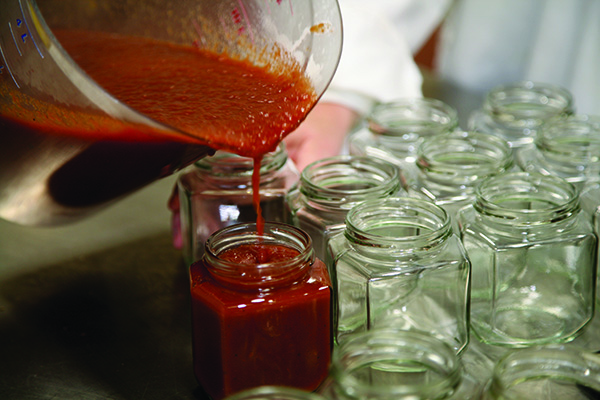From Kitchen to Shelf
Friday, October 6, 2017

If you ever wished everyone could try your grandma’s secret recipe, a program at Oklahoma State University can create that opportunity.
The Robert M. Kerr Food & Agricultural Products Center is home to helpful, value-added programs, but one distinct program is the Basic Training workshop, said Mandy Gross, FAPC communications services manager. This program is a day-long course to teach participants how to commercialize their homemade products with the help of FAPC.
Basic Training occurs every other month and costs $175. It includes a luncheon, speakers from the Oklahoma Health Department and the Made in Oklahoma program, and a trademark expert. The class enrolls up to 24 potential clients interested in learning more about commercializing their food products.
“During the class, everything is laid out for the clients to show what it takes to start a business,” Gross said.
Some workshop topics include the cost of doing business, food regulations and how to target customers, she said.
“Usually only 10 percent of the Basic Training graduates will take their product any further,” she said. “Often, the entrepreneurs do not understand what it takes to start a food business before attending the workshop.”
Suan Grant of Suan’s Inc. attended Basic Training in February 2009.
“I had a good product, but I didn’t know how to get it to market,” Grant said. “They knew how to get it to market. They were with me every step of the way and still are today.”
If clients want to take their products to market after attending Basic Training, they meet with an FAPC food scientist and an FAPC business and marketing associate for scale-up, Gross said.
A scale-up is the process of taking a recipe and making it in the test kitchen for the recipe to be converted into the appropriate units for large batches. Darren Scott, FAPC food scientist and sensory specialist, meets with clients at this point.
Once clients decide to pursue commercialization of their products, the entrepreneurs discuss their products with Scott. The clients go to the test kitchen to make their products.
“We make up a small batch that is typically made the same way it is made at home,” he said. “The key difference is we are taking weights of everything.”
This way, the recipe can be converted into a large-scale batch for mass production, Scott said. Once ingredients have been weighed and measured, the client is taken to the industrial-sized kitchen to make a big batch of the product.
“We really see here if the product changes in any drastic way or if there are any problems with a difference in taste,” Scott said.
Frequently, clients will notice changes in taste or consistency first, Scott said. This provides a great time to address these issues and see if anything can be done to make the product as similar as possible to the original, he said.
Erin Johnson, FAPC business and marketing client coordinator, said changes are frequently needed in the recipe before the product is taken to mass production.
“Often, the recipe will have extra water to account for cooking it on a stove top where the heat comes from the bottom,” she said. “When the client uses our steam-jacketed kettles, that extra water can change the recipe.”
The main goal of the program is to help mix the culinary art with the necessary science, Johnson said.
“Once we have finished in the kitchen, Erin will then take them aside to discuss a marketing and business strategy,” Scott said.
Clients then decide whether they want to produce and package their own product or if they want to use a co-packer, Johnson said.
A co-packer is a contract packer that markets and packages goods for other companies, she said.
More than likely, clients will choose to use a co-packer for efficiency, she said. However, some clients may choose to build their own industrial kitchen and start from scratch, she said.
“Whether they use a co-packer or begin their business on their own, we can help them make the best decision for their business,” Johnson said.
Grant said the availability of entrepreneurship experts in FAPC makes this program special.
“They are there if you have questions, and if they don’t have answers, they know who does,” Grant said. “They are an asset to the state of Oklahoma.
By: Author: Rosemary Giannini
